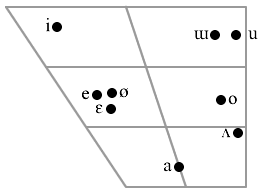| (documentation KoreanLanguage EnglishLanguage "The KoreanLanguage is a language isolate spoken in SouthKorea. SIL code: KKN. ISO 639-1: ko. ISO 639-2: kor. Population: 42,000,000 in South Korea (1986). Population: total all countries 78,000,000 (1999 WA). Region: Also spoken in 31 other countries including American Samoa, Australia, Bahrain, Belize, Brazil, Brunei, Canada, China, Germany, Guam, Japan, Kazakhstan, Korea, North, Kyrgyzstan, Mauritania, Mongolia, New Zealand, Northern Mariana Islands. Alternate names: HANGUOHUA, HANGUK MAL. Dialects: SEOUL (KANGWONDO, KYONGGIDO), CH'UNGCH'ONGDO (NORTH CH'UNGCH'ONG, SOUTH CH'UNGCH'ONG), KYONGSANGDO (NORTH KYONGSANGDO, SOUTH KYONGSANGDO), CHOLLADO (NORTH CHOLLADO, SOUTH CHOLLADO), CHEJU ISLAND. Comments: There is a difference of opinion among scholars as to whether or not Korean is related to Japanese. Some scholars suggest that both languages are possibly distantly related to Altaic. Dialect boundaries generally correspond to provincial boundaries. Some dialects are not easily intelligible with others (Voegelin and Voegelin 1977). The suffix -do on dialect names means 'province'. Comprehension of Standard Korean may be lower on Cheju Island. National language. Grammar. SOV. Higher adult illiteracy is reported on Cheju Island. Korean script (Hangul) used. The McCune_Reischauer system is the official Roman orthography in South Korea used for maps and signs. Buddhist, Christian. Bible 1911-1993. Also spoken in: China. (Language name: KOREAN.) Population: 1,920,597 in China (1990 census). Comments: Considered one of the main official nationalities. 'Chaoxian' is the name used in China. High level of education. Radio programs. Agriculturalists. Buddhist, Christian. Bible 1911-1993. See main entry under Korea, South. Also spoken in: Japan. (Language name: KOREAN.) Population: 670,000 in Japan, .5% of the population (1988). Comments: Bilingualism in Japanese. Buddhist, Christian. Bible 1911-1993. Also spoken in: Korea, North. (Language name: KOREAN.) Population: 20,000,000 in North Korea (1986). Dialects: HAMGYONGDO (NORTH HAMGYONGDO, SOUTH HAMGYONGDO), P'YONG'ANDO (NORTH P'YONG'ANDO, SOUTH P'YONG' ANDO), HWANGHAEDO. Comments: Dialect boundaries generally correspond to provincial boundaries. Some dialects are not easily intelligible with others (Voegelin and Voegelin 1977). National language. SOV. Korean script (Hangul). Buddhist_Confucianist, Christian. Bible 1911-1993. Also spoken in: Thailand. (Language name: KOREAN.) Comments: Buddhist, Christian. Bible 1911-1993.(extract from http:/ / www.ethnologue.com/ )") |
Languages.kif 3078-3111 |
|





